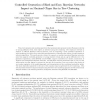Free Online Productivity Tools
i2Speak
i2Symbol
i2OCR
iTex2Img
iWeb2Print
iWeb2Shot
i2Type
iPdf2Split
iPdf2Merge
i2Bopomofo
i2Arabic
i2Style
i2Image
i2PDF
iLatex2Rtf
Sci2ools
AI
2006
Springer
2006
Springer
Controlled generation of hard and easy Bayesian networks: Impact on maximal clique size in tree clustering
This article presents and analyzes algorithms that systematically generate random Bayesian networks of varying difficulty levels, with respect to inference using tree clustering. The results are relevant to research on efficient Bayesian network inference, such as computing a most probable explanation or belief updating, since they allow controlled experimentation to determine the impact of improvements to inference algorithms. The results are also relevant to research on machine learning of Bayesian networks, since they support controlled generation of a large number of data sets at a given difficulty level. Our generation algorithms, called BPART and MPART, support controlled but random construction of bipartite and multipartite Bayesian networks. The Bayesian network parameters that we vary are the total number of nodes, degree of connectivity, the ratio of the number of non-root nodes to the number of root nodes, regularity of the underlying graph, and characteristics of the condi...
AI 2006 | Artificial Intelligence | Bayesian Networks | Difficulty Level | Random Bayesian Networks |
| Added | 10 Dec 2010 |
| Updated | 10 Dec 2010 |
| Type | Journal |
| Year | 2006 |
| Where | AI |
| Authors | Ole J. Mengshoel, David C. Wilkins, Dan Roth |
Comments (0)

